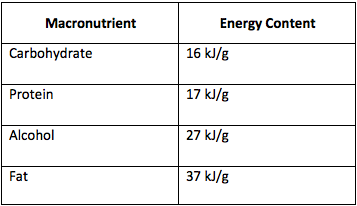Energy (kilojoules)
A kilojoule (kJ) is simply a measure of energy. For our bodies to function, we need energy to fuel them. Under Australian food laws, it is a requirement to display energy as kilojoules to describe the amount of energy found in a serve of food. Another term you might have heard of for energy is calories. Calories are an American measure and will often be seen on American packaged goods. These terms are used interchangeably to talk about energy. However, it is important to know that 1 Cal = 4.2 kJ.
How many kilojoules does a person need?
The average daily kilojoule (energy) requirement for an adult is approximately 8700kJ or 2000Cal. A person’s daily energy requirements differ based on their gender, how much exercise they do, their height and weight, and whether or not they suffer from particular illnesses or disorder. While the average healthy Australian adult requires about 8700kJ/day, this may differ for you and will undoubtedly differ for your child.
To help calculate your energy requirements visit the 8700 campaign page:
http://www.8700.com.au/kj-explained/your-ideal-figure/
What is excess energy?
When it is said that food contains excess energy, it means that it could lead to eating more kilojoules than your body requires. When excess energy is consumed (above our daily energy needs) it gets stored as fat. This could increase the risk of becoming overweight or obese if not balanced with exercise.
The food we eat contains varying amounts of energy depending on how much fat, carbohydrates, protein or alcohol it contains. Each gram of fat provides 37kJ in comparison to carbohydrates and proteins, which contain 16kJ and 17kJ respectively. Alcohol contains 27kJ/g.

This is why there are warnings around consuming a high-fat diet, as it’s the most energy dense nutrient. Eating too much fat could quickly lead to excessive kilojoule (energy) intake and consequent weight gain. However, it’s important to remember that not all fats, carbohydrates or proteins are nutritionally equal.






